Photo: Recording Academy
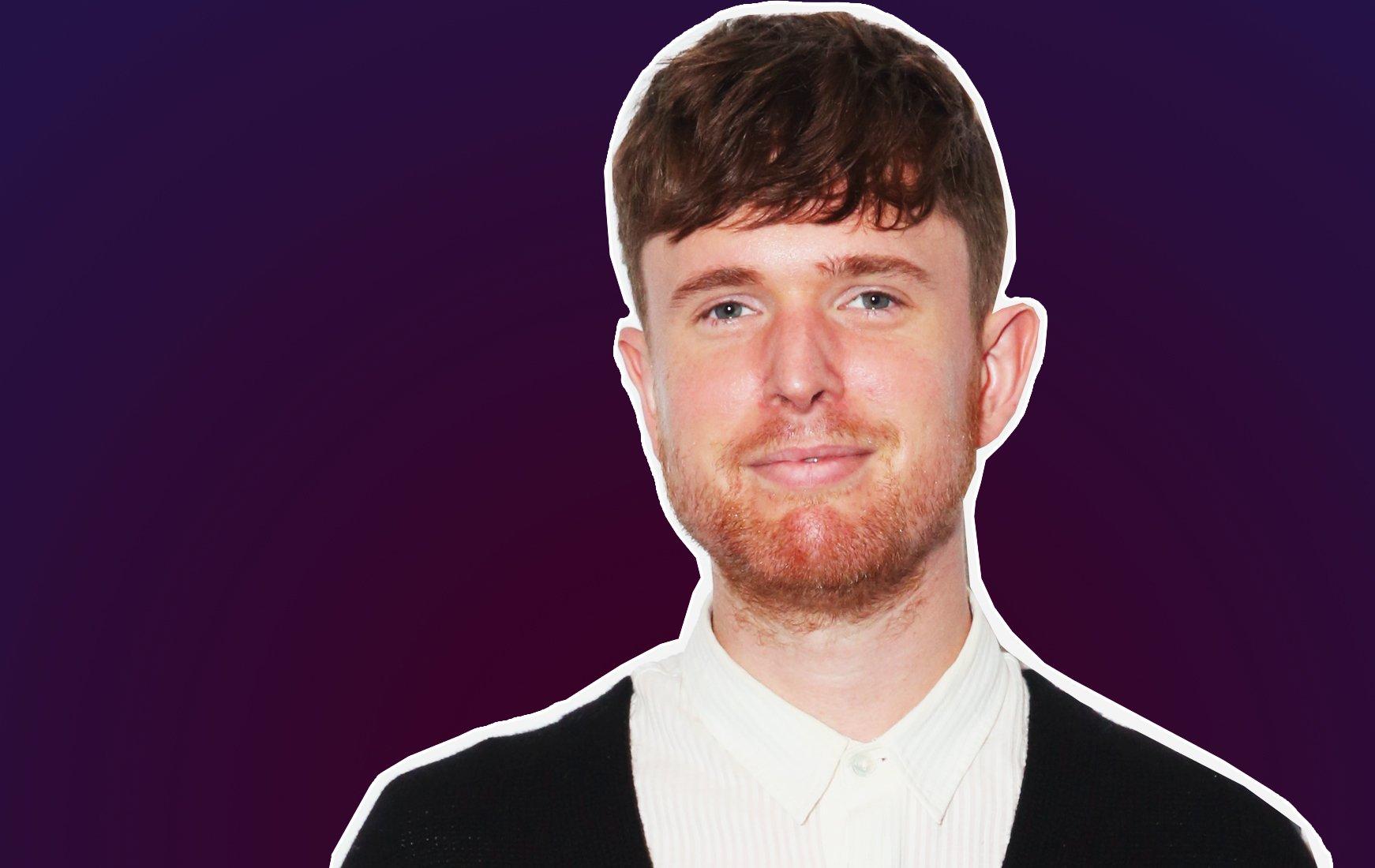
James Blake
news
James Blake On 'Assume Form' Collabs: "A Dream Come True" | GRAMMY Museum
The GRAMMY-winning "Retrograde" singer talks about his 2019 album and shares who inspired him to pursue a career in music
Shortly before GRAMMY winner James Blake treated 300 or so lucky GRAMMY Museum guests to a lively conversation and acoustic piano performance, the British electro-soul artist caught up with the Recording Academy. In our Behind The Scenes conversation, Blake spoke about his empowered 2019 album, Assume Form—which is currently nominated for Best Alternative Music Album at the 2020 GRAMMYs—and how he chose the epic collaborator list that includes current Best New Artist nominee Rosalía, André 3000, Travis Scott and Moses Sumney.
The "Retrograde" singer also shared who inspired him to pursue a career in music. (Spoiler alert, the answer is really cute.)
Watch our exclusive Behind The Scenes video with Blake below, and read on to learn more about the late-2019 GRAMMY Museum event, including what five songs he performed.
"They're just all some of my favorite artists, so it was a dream come true, really, of a collaborator list," he told us. "I've been lucky enough that some of the people that I listen to also listen to some of my music and were happy to oblige to part of it."
"I think they all brought something really unique and we were on the same wavelength when we were making the music, so it feels natural, it feels kind of organic, and I'm so happy and honored they were able to join it."
Blake also shared how influential his father, the senior James Litherland (Blake was born James Blake Litherland), has been to his own music. Litherland is a life-long musician and played with the late-'60s U.K. rock outfit Colosseum. In 2011, Blake covered and reimagined his father's song "Where to Turn" on "The Wilhelm Scream," featured on his 2011 self-titled debut album.
"Over my career, there's been a running theme of coming into the foreground…with every reveal, comes some kind of risk," Blake told GRAMMY Museum's Artistic Director Scott Goldman, who moderated the event. "If Assume Form was anything, it was not only a version of songwriting clarity but also emotional clarity. It was the most clear I'd felt in a long time, so it was a good time to make an album."
Read: Find Out Who Just Made History With Their GRAMMY Nominations: 2020 GRAMMYs By The Numbers
He also dove a bit more into the album's collaborators, praising André's musicality and his "heady-ass verse" on "Where's The Catch." "His verse is f**king genius and I couldn't have written that." Blake also shared his love of Spanish nu-flamenco queen Rosalía, who brought her otherworldly vocals and fierceness to "Barefoot In The Park," noting that working with her felt super easy and natural.
After the in-depth conversation, Blake made his way over to the piano for a soulful performance that opened with Assume Form's "Are You In Love?" and closed with his "favorite song ever written about a relationship:" Joni Mitchell's "Case Of You," which he covered on his 2011 EP, Enough Thunder. In between those two heartwrenching love songs, he treated fans to "Love Me In Whatever Way," from 2016's The Colour In Anything, "Overgrown," from his 2013 album of the same name, and "Vincent," his 2017 Don McLean cover.
Don't forget to tune into the 62nd GRAMMY Awards on Sun., Jan. 26 to find out if Blake will take home the golden gramophone for Best Alternative Music Album. GRAMMY.com and CBS will be your ticket to find out all the winners and watch all the fun on GRAMMY day—see you there!
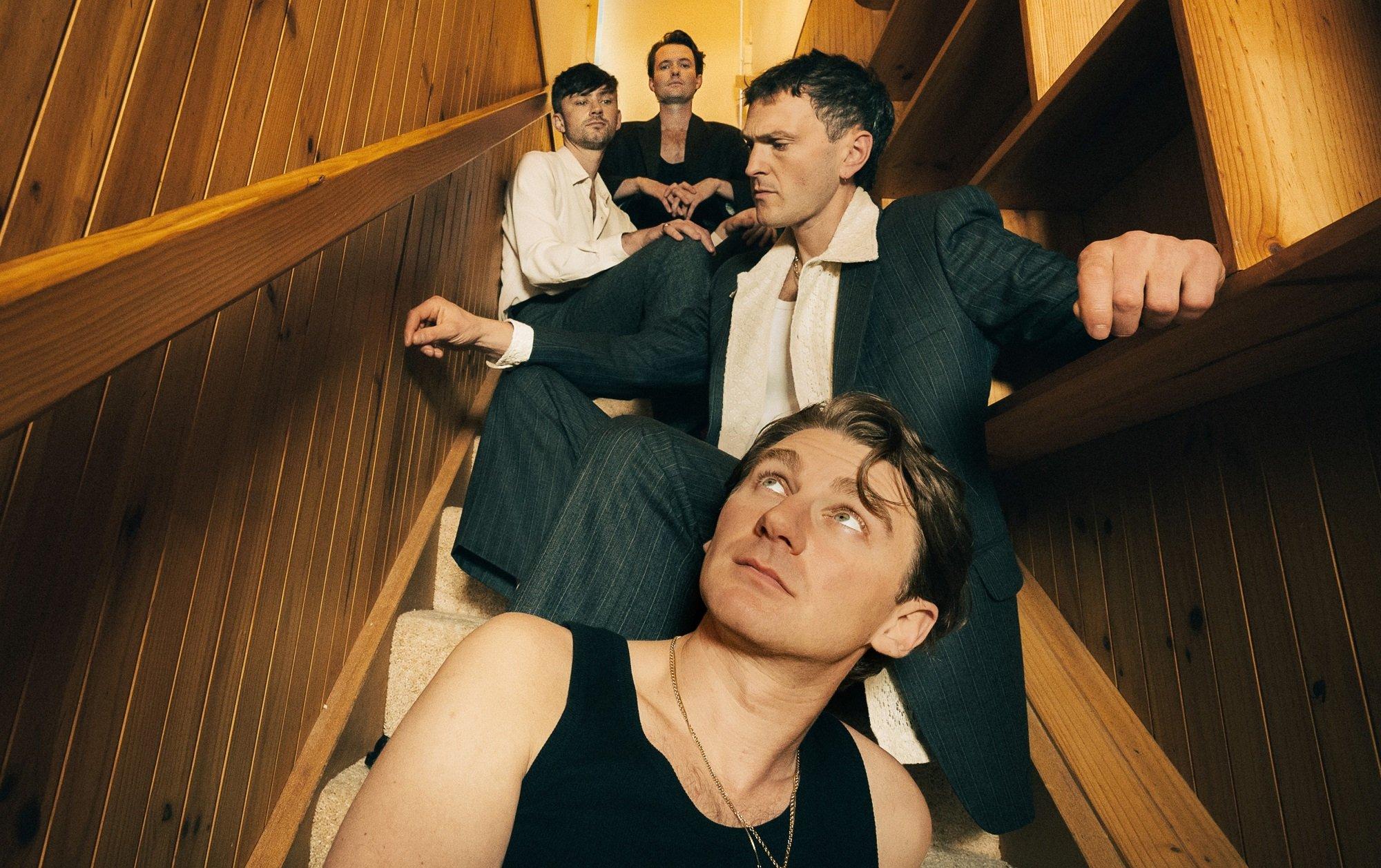
Photo: Drewby Perez
interview
Ladies And Gentlemen, Glass Animals Are Floating In Space
For Glass Animals, breaking through with their last album during the pandemic was an isolating experience. They brought those feelings to the fore with 'I Love You So F—ing Much,' where the Englishmen embrace a sort of majestic, celestial loneliness.
Remember the atmospheric river of 2024? Glass Animals' Dave Bayley thought he'd drown in it. He'd holed up in a cheap Airbnb to write his band's latest album, I Love You So F—ing Much — and soon realized why it was so cheap.
"When I got there, I realized why. It was one of those stilt houses, hanging off the edge of a cliff," Bayley tells GRAMMY.com. "There was s— flying down and trees coming out of the ground, flying down the mountain. I was like, I'm dead. This is it. This is the end."
Late at night, observing the bedlam of the natural world, Bayley didn't feel planted on terra firma at all; he felt as if he was floating in space. Which turned out to be the impetus for the English indie-psych-poppers' latest statement — space being a metaphor for disconnection and unmooring. (The album arrived July 19 via Republic; Bayley remains the sole producer.)
"I think I had a lot of imposter syndrome, and felt very disconnected from reality as well," Bayley says of the Covid era — which unfortunately dovetailed with the breakout success of their last album, Dreamland. But by some strange alchemy, Glass Animals spun that feeling into emotional warmth.
As you absorb songs like "Creatures in Heaven," "A Tear in Space (Airlock)" and "Lost in the Ocean," read on for an interview with Bailey about how this celestial, lonesome, yet oddly swaddling and comforting album came to be.
This interview has been edited for clarity.
How would you describe the four-year gap between Dreamland and I Love You So F—ing Much?
Like lifetimes, honestly. And at the same time, it sort of feels like yesterday as well.
It's very, very confusing — because we finished Dreamland, and then Covid hit. We were about to release it, and then we postponed, and postponed, and realized the pandemic is not going away. We promised people the album; we needed to release it to, like, survive. So, we released it thinking it would probably tank. And it did something absolutely amazing, unexpected.
Most people, when something like that happens, get to be out and experience it, and see it happening in the real world — playing live shows, and they feel part of it, and it's part of them. Whereas I was trapped in my bedroom in my underpants watching it all happen through social media and email updates.
You needed to make it to survive? Say more about that.
I mean, that was our livelihood. Somehow, this has become a profession — I have to pinch myself when I say that, it's the best thing ever.
But you can't just not release music. You have to keep writing and releasing music to maintain it as a profession. We were four years out from the record before that, at that point.
Odd question: if a music career was inaccessible to you, what would be your professional destiny, as it were?
I was trying to be a doctor before all of this happened. I was four years deep into medical school, actually. Then, a series of strange and terrible things happened in my life that made me like, I want to take a break from med school.
I was using music as a therapy, almost, to get over some of the things that had happened. I was making music to feel better, really, and connected somehow. Someone, somewhere, maybe, put it on SoundCloud.
**What was the thematic seed of I Love You So F—ing Much?**
I guess that sense of detachment was a big thing — because it not only went for the duration of the pandemic, but even after the pandemic, we were touring. And because there was no insurance for people touring against Covid, we still had to isolate and bubble within ourselves. It was going to extend us another year and a half, just being in this metal tube.
It was like, the biggest shows we ever had — they were amazing. We'd walk on stage, and for an hour and a half, be slammed in the face with emotion and energy. And then we'd walk offstage back to the bus, and we couldn't interact and be part of what was happening afterwards.
It just made us all feel even more surreal — it felt like a dream.
Talk about the sound you wanted to capture.
This one, I wanted to sound a specific way; I knew the equipment to get. I got about six synths and 20 pedals that fit the sound — a couple of guitars and a drum kit that fit the sound — and I just went for it. You could turn anywhere, and the sound would fit into the context of the record.
**If you think of Glass Animals' discography as stops on a journey via train, which stop is I Love You So F—ing Much?**
We've reached this retro-futuristic stuff, and I think it's definitely a progression from the last album.
I definitely set my own kind of '90s, '80s production — and now there's a bit of a vaporwave thing going on, but it was still pretty analog and nostalgic. It seems to be almost like the train went backwards.
Then, on the songwriting side, I was trying to really make sure the core of the sounds had [integrity]; they could basically be played with guitar and voice alone. I wanted the chords to tell the story of the song as well; we'd kind of done that in the past, but I'd never really focused on it like I did this time.
I wanted the chords to keep evolving through each section of the song — just twist the atmosphere of the song in each section.
Give me a line on I Love You So F—ing Much that you feel sums up what we're talking about.
"Show Pony" is the first song; everyone creates this idea of love, and what love should be, based on what they've seen and experienced growing up. Seeing their family, seeing their friends — you're walking down the street, and you see a couple arguing, and you form these [impressions of] love.
"Show Pony" is kind of the blueprint; it gives context for the rest of it. And then, the line that comes right after it: "What the hell is happening? What is this?" I like that as the real beginning of the record, after the table of contents — the first song.
Where do you think Glass Animals will go from here?
It's a good question, because I don't really think I'm there yet. I have a few ideas — but to be honest with you, I never end up going with any of the first ideas that I have.
Before this iteration of the album, I wrote a whole other space album that just felt really cold and hollow and empty — like a vacuum. It wasn't cool; it didn't have enough emotion, and it didn't feel soulful enough. I just binned it, and sacked off; it's in the trash.
It wasn't until I stumbled on this concept of juxtaposing these kinds of small, intimate moments with the size of space, that I put two and two together — and worked out how I could do a space album without it being f—ing s—.
Explore More Alternative & Indie Music
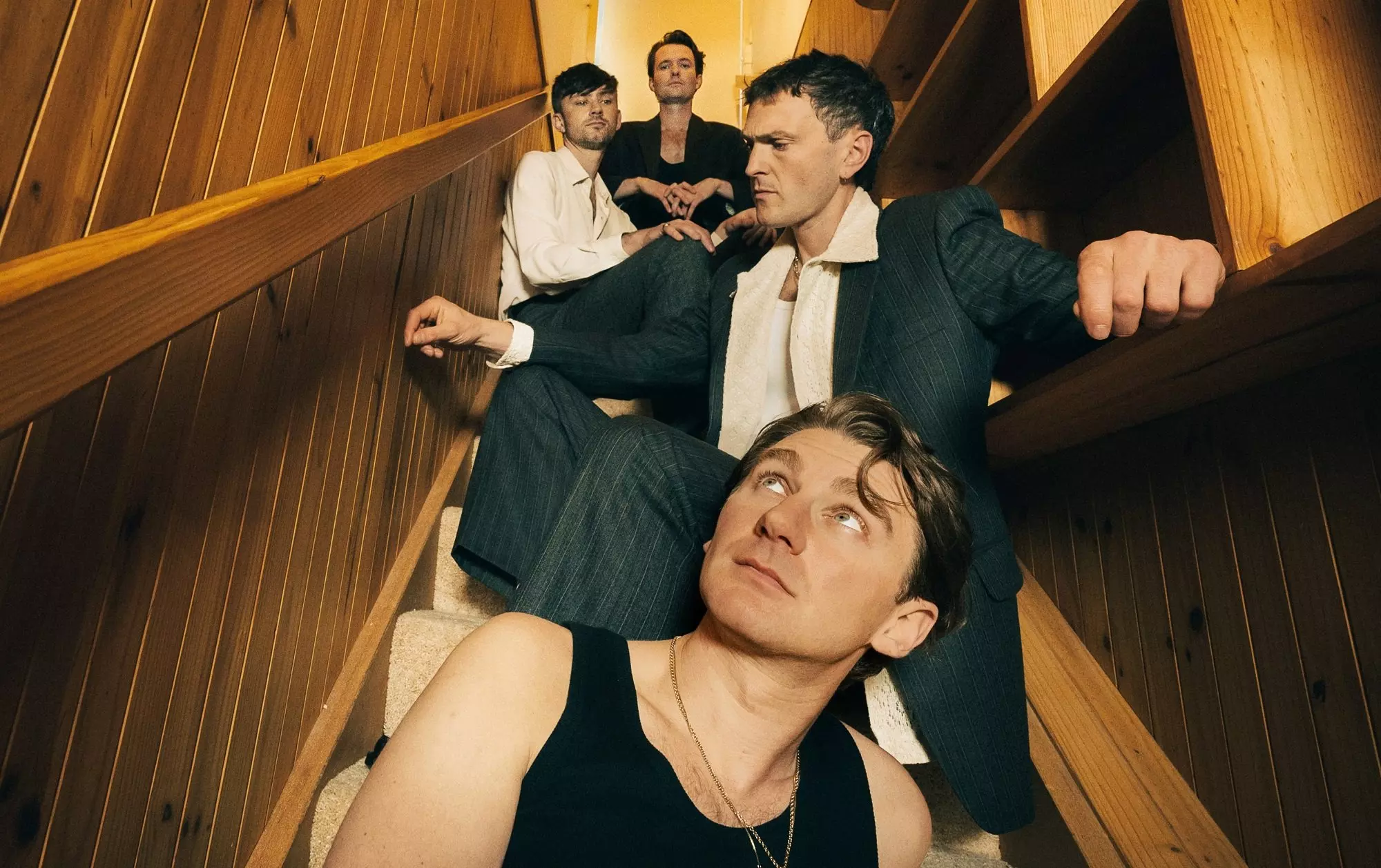
Ladies And Gentlemen, Glass Animals Are Floating In Space

Daniel Nunnelee's "Why Don’t You Just Come Over"
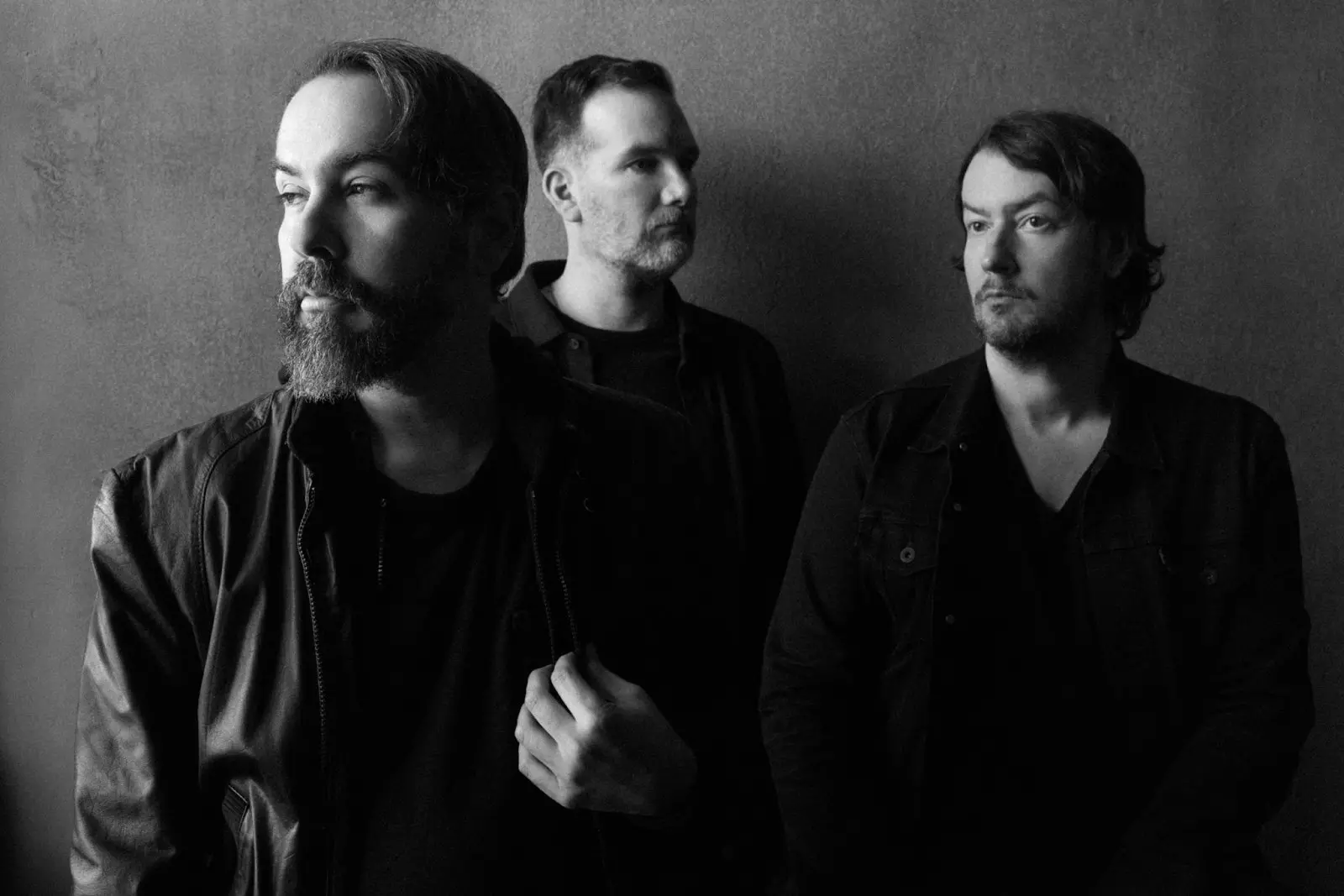
X's Mark The Spot: How Cigarettes After Sex Turn Difficult Memories Into Dreamy Nostalgia
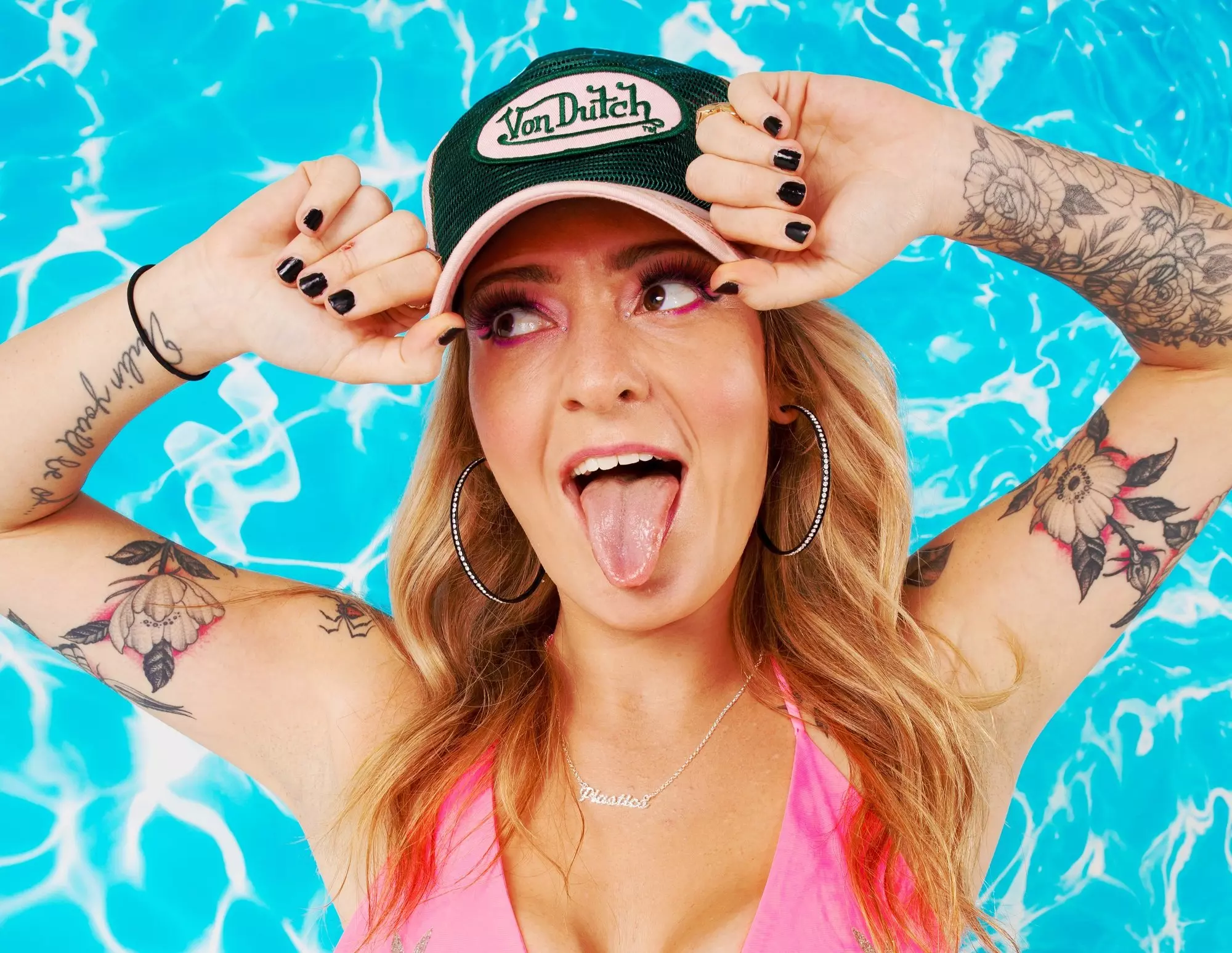
Meet Scene Queen, The "Chaotic Mess" Cleaning Up The Alternative Scene

Where St. Vincent Keeps Her GRAMMY Awards
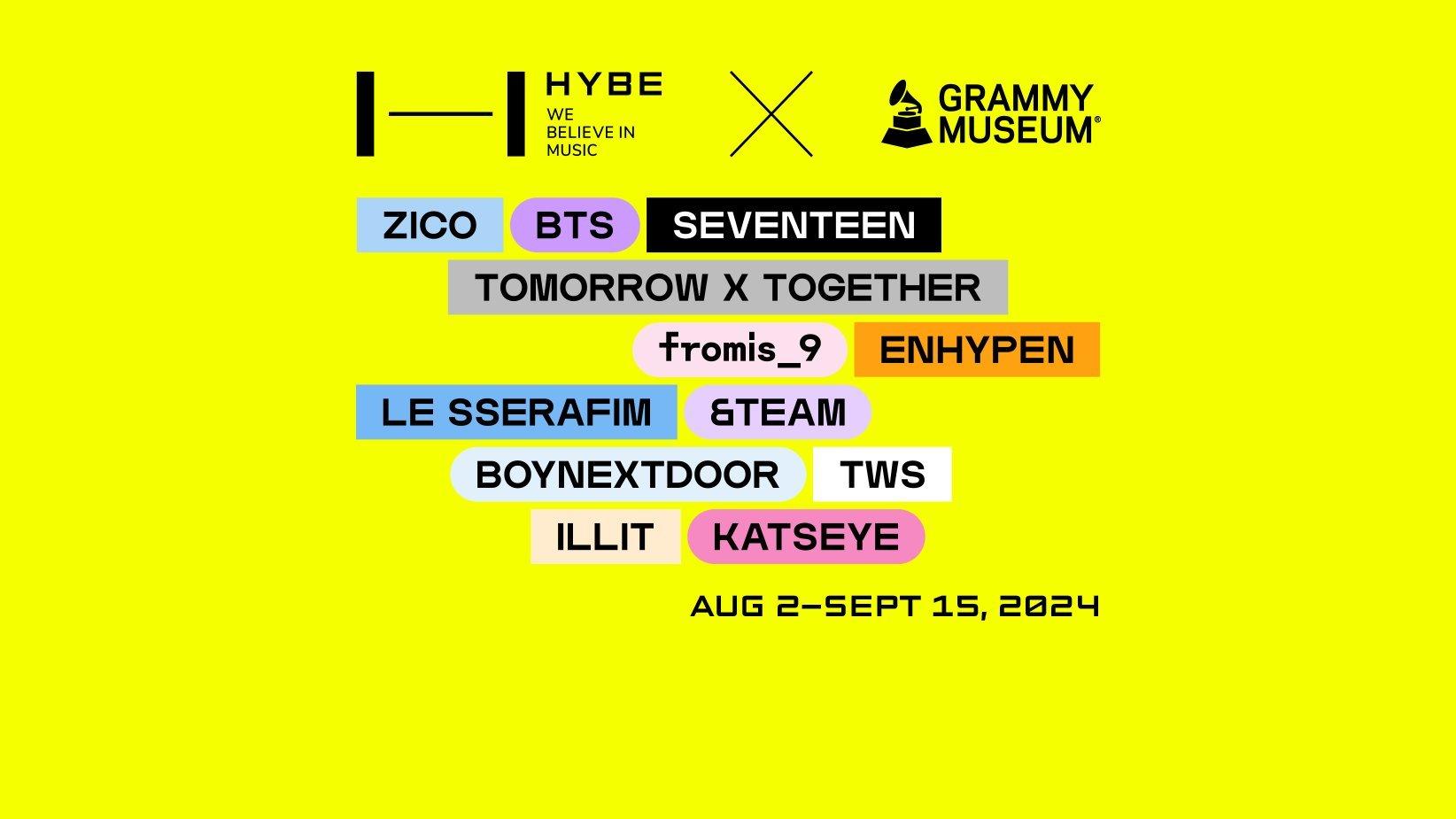
Graphic courtesy of the GRAMMY Museum
news
GRAMMY Museum Partners With HYBE For New K-Pop Exhibit 'HYBE: We Believe In Music' Opening Aug. 2
Running Aug. 2 through Sept. 15, the GRAMMY Museum exhibit showcases artifacts from superstar HYBE artists, including BTS, SEVENTEEN, TOMORROW X TOGETHER, ENHYPEN, LE SSERAFIM, and many more.
The GRAMMY Museum joins forces with HYBE to present its newest exhibit, HYBE: We Believe In Music, A GRAMMY Museum Exhibit. This interactive exhibit chronicles the history and impact of HYBE, and showcases its legacy of unparalleled innovation and creativity as a trend-setting global entertainment brand.
The exhibit opens on Aug. 2 in downtown Los Angeles and features spotlight moments with K-pop stars BTS, SEVENTEEN, TOMORROW X TOGETHER, ENHYPEN, LE SSERAFIM, and many more. "HYBE: We Believe In Music" runs through Sept.15. The exhibit will kick off on Aug. 1 with "Global Spin Live: TWS," a program featuring a moderated conversation with K-pop group TWS, followed by a performance.
The exhibit traces HYBE's evolution and influence by showcasing instantly recognizable artifacts from its roster of artists, creators, and fans. The displays notably feature original outfits worn in iconic music videos such as "Yet To Come (The Most Beautiful Moment)" by BTS, "MAESTRO" by SEVENTEEN, "Sugar Rush Ride" by TOMORROW X TOGETHER, "Sweet Venom" by ENHYPEN, and "EASY" by LE SSERAFIM. HYBE: We Believe In Music also boasts accessories and performance gear donned by ZICO, fromis_9, BOYNEXTDOOR, TWS, &TEAM, and ILLIT. The exhibit marks the first time these artifacts will be on display together in one location.
Other highlights include interactive sing-along and dance rooms, a dedicated Fan Section celebrating the endless support between HYBE artists and their fandoms, a Mono to Immersive room featuring BTS's 2022 GRAMMYs performance of "Butter," and a Photoism Booth that allows visitors to pose alongside their favorite K-pop artists. The GRAMMY Museum exhibit will also feature exclusive video content with producers, artists, music videos, and more.
"HYBE and their artists represent the present and future of the global music landscape, and our goal with this exhibit is to deepen the appreciation and respect for its creators and performers," says Michael Sticka, President/CEO of the GRAMMY Museum. "HYBE has contributed to creating a playground of innovation that inspires fandoms that transcend age, gender, geography and beyond. The GRAMMY Museum is thrilled to provide a space where fans can express their love for K-pop and feel closer to their favorite idols."
Read more: 11 Rookie K-Pop Acts To Know In 2024: NCT Wish, RIIZE, Kiss Of Life & More
HYBE Chief Operating Officer Taeho Kim added, "Putting out an exhibition that captures HYBE's journey is a new experience for us. We're very excited about this partnership with GRAMMY Museum, and we look forward to welcoming music fans who visit the museum to enjoy and connect with our historical pieces."
The exhibit highlights the roots of HYBE's meteoric rise. In 2005, South Korean producer, composer, and songwriter Bang Si-Hyuk, known as "hitman" Bang, changed the trajectory of Korean pop music by launching the record label Big Hit Entertainment. He soon signed a talented 16-year-old rapper named RM, which became the first step in creating the label's groundbreaking boy band — BTS. With the group's global success, "hitman" Bang and Big Hit Entertainment became known as musical trailblazers and record industry innovators. Big Hit Entertainment has now evolved into HYBE, which only continues to break boundaries in music and beyond.
More K-Pop News
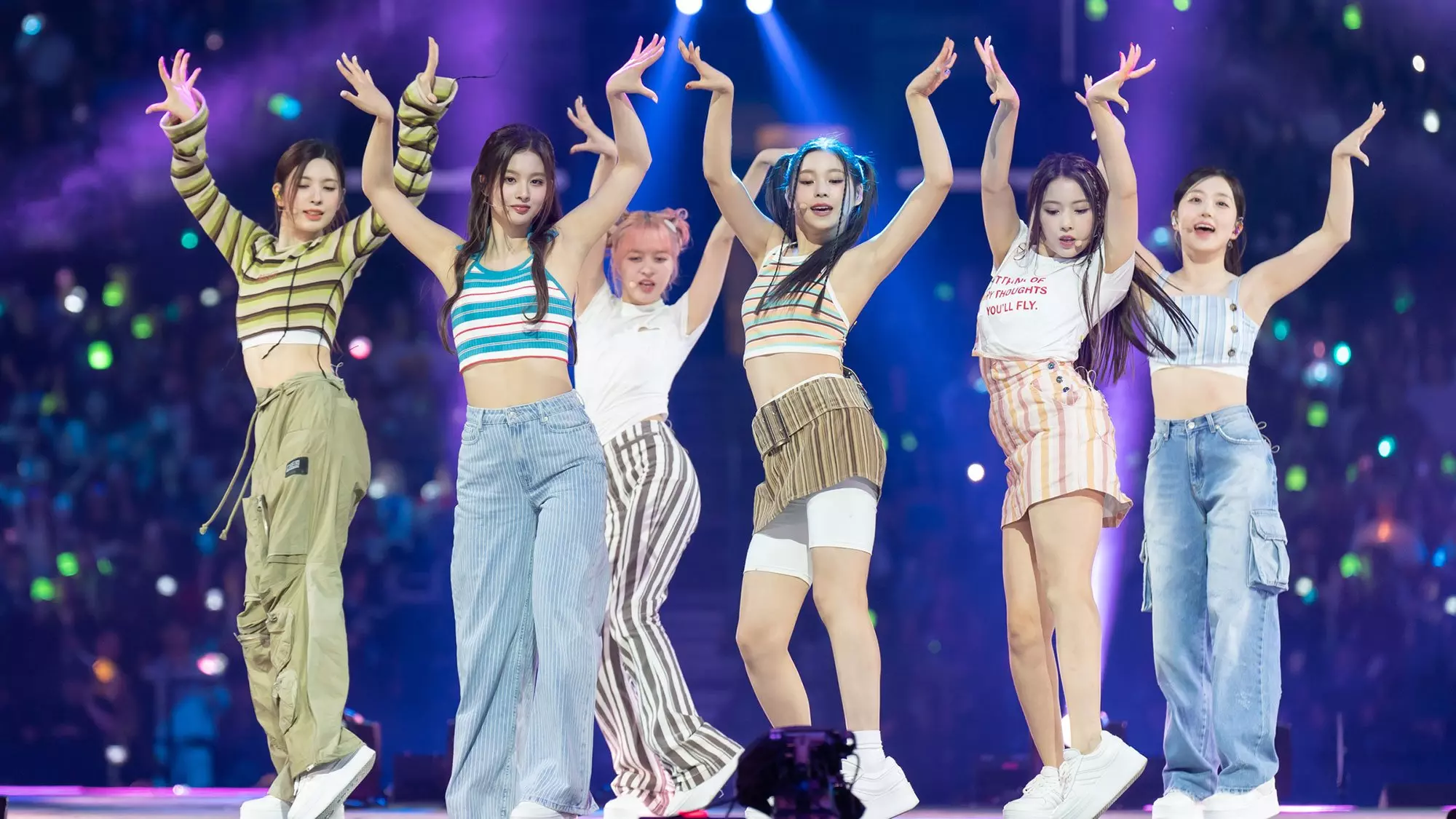
KCON L.A. 2024 Returns: Get Ready With This Playlist Featuring NCT 127, Zerobaseone, ENHYPEN, Zico & More
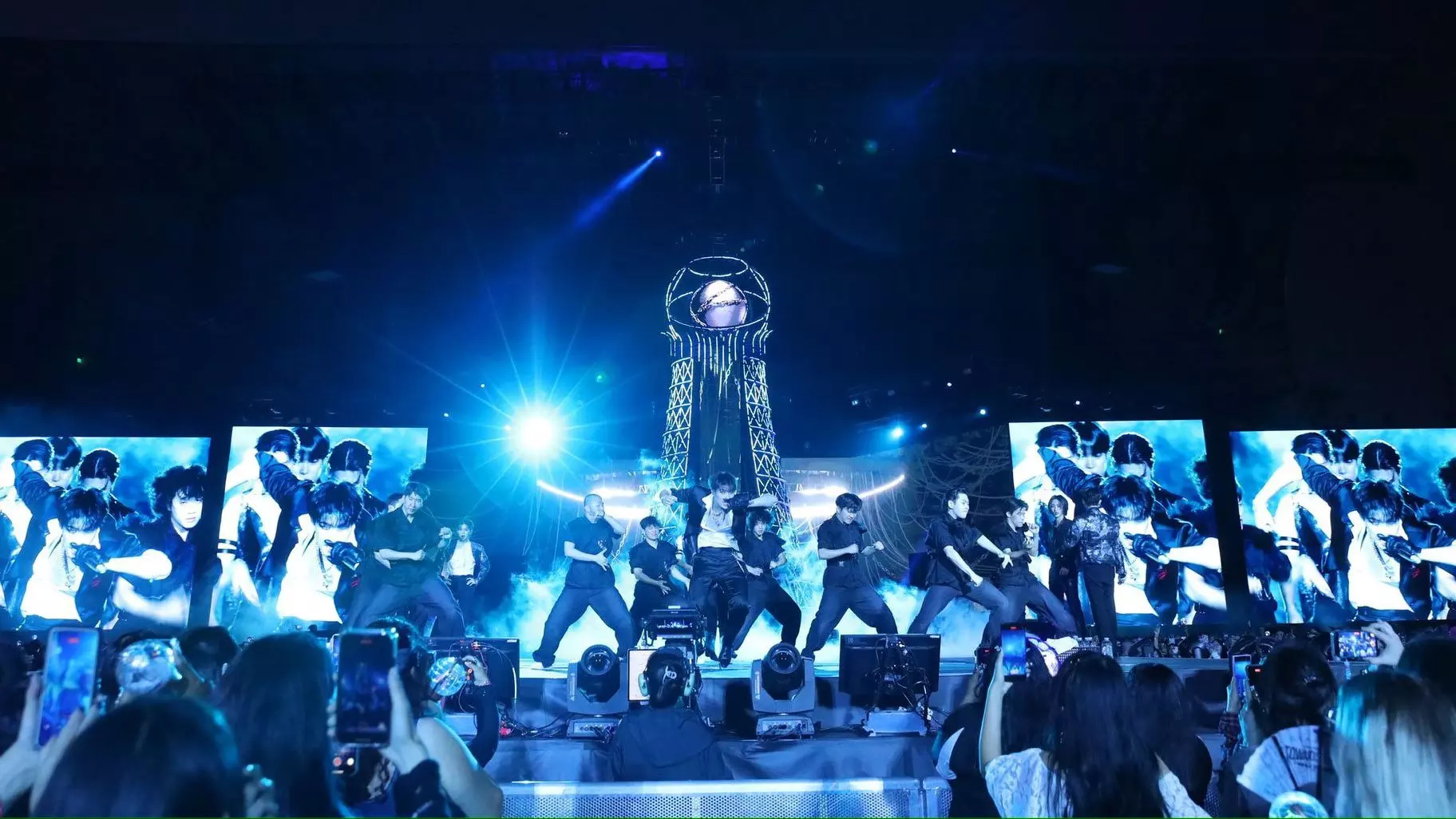
ATEEZ’s First U.S. Stadium Show Was A Triumph & Testament To Their Growth
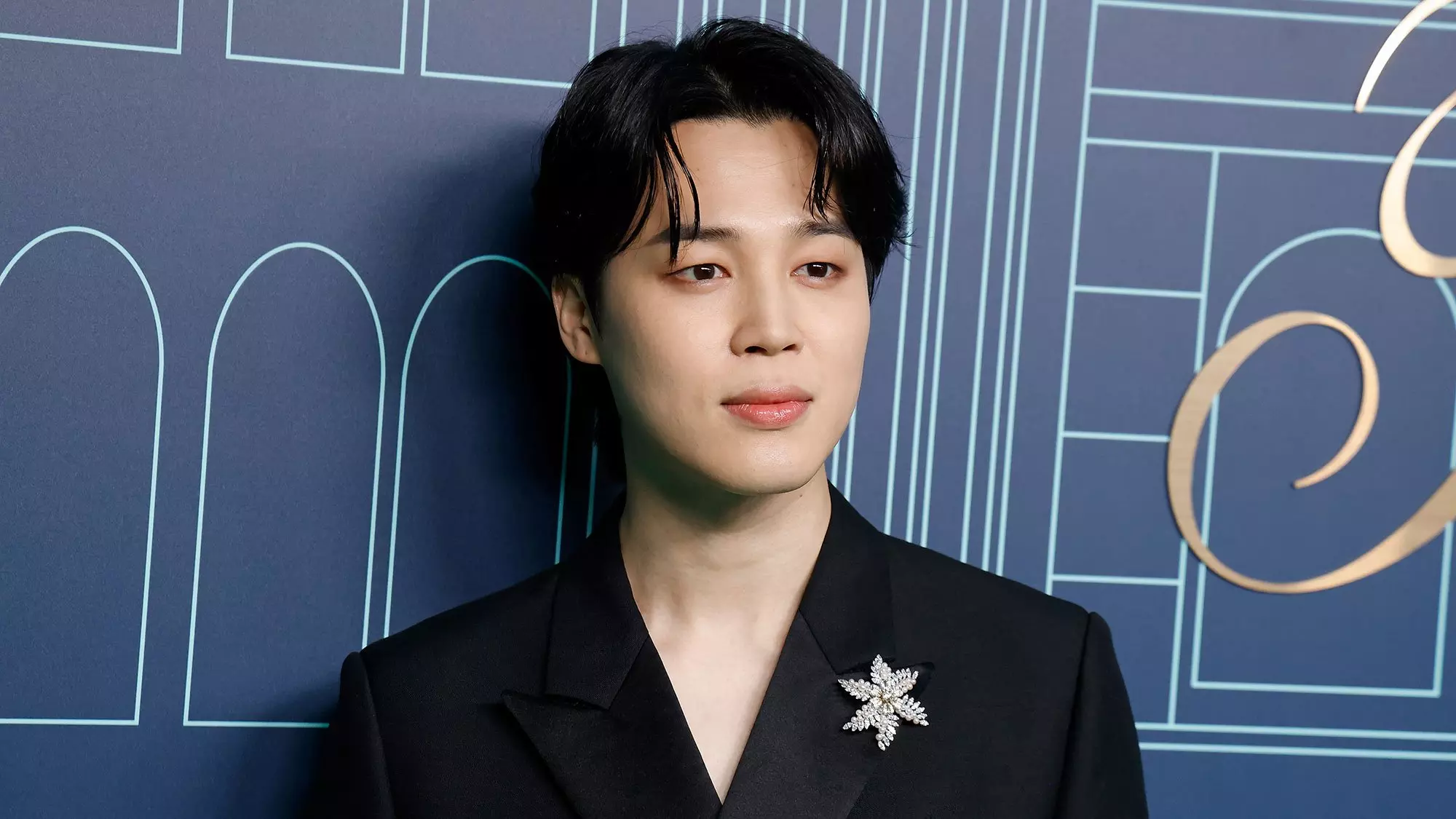
5 Takeaways from BTS Jimin's New Album, 'MUSE': A Bold Exploration Of Love And Inspiration

NCT 127 Essential Songs: 14 Tracks You Need To Know From The K-Pop Juggernauts

ENHYPEN And JVKE "Say Yes" To Cross-Cultural Collabs & Exploring New Genres
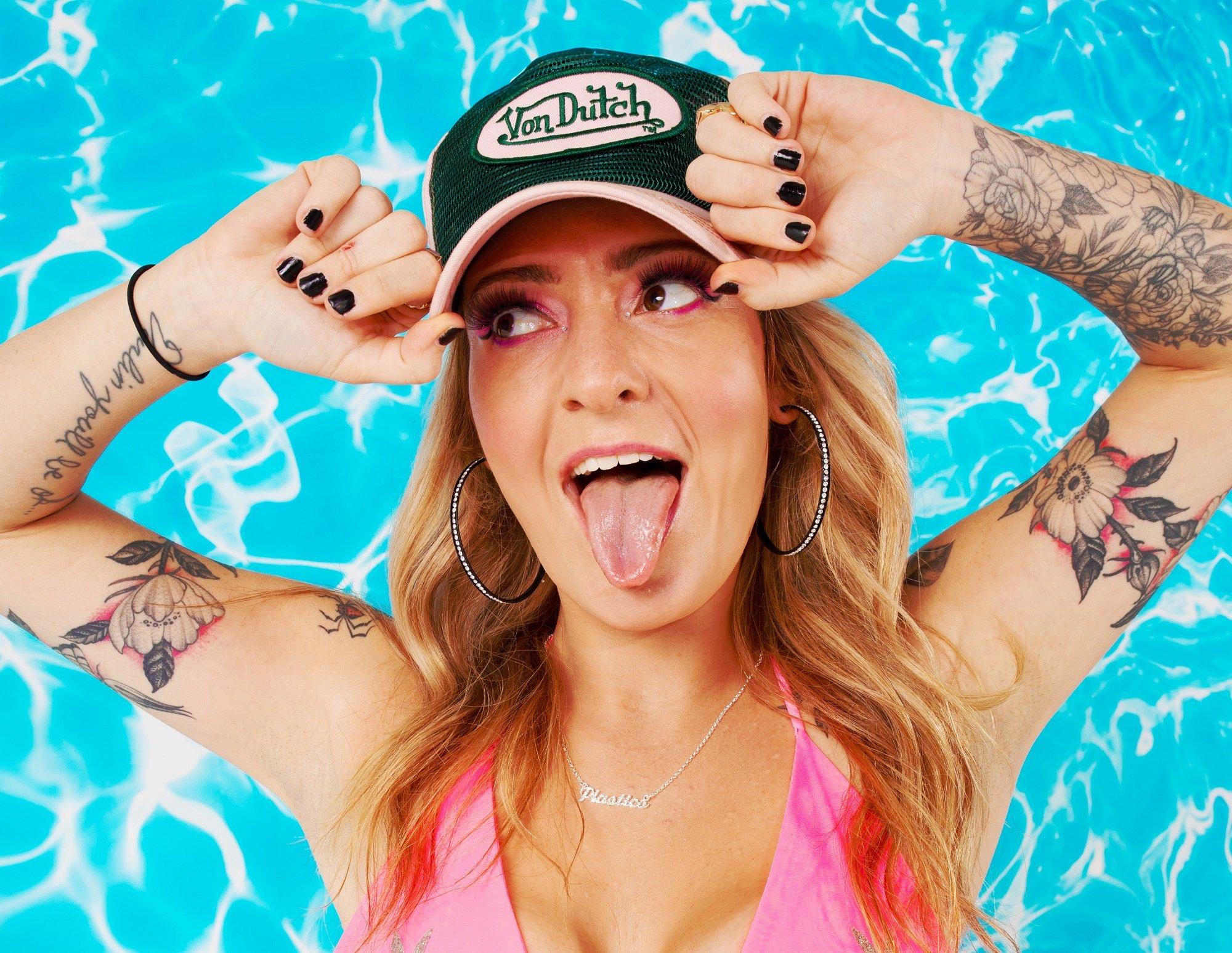
Photo: Danin Jacquay
interview
Meet Scene Queen, The "Chaotic Mess" Cleaning Up The Alternative Scene
"I'm cool taking sticks and stones thrown my way if it means that 10 years down the line there's gonna be another girl that tries to do what I do and gets zero flak for it," Scene Queen says of her take-no-prisoners album, 'Hot Singles In Your Area.'
"F*** the scene, I’m the queen!" Scene Queen announces early on her debut album, Hot Singles in Your Area. Delivered in a snarky sing-song, the exclamation serves as something of a mission statement for everything the singer has set out to accomplish with her winking metal-pop persona.
On Hot Singles (out June 28 via Hopeless Records), the artist calls out the bad behavior that’s run rampant in the alternative music scene for decades. From the insidious grooming of teen fans ("Headline spot goes to the abuser/ Half my idols are f—ing losers," she sings on blistering lead single "18+"), to the blatant discrimination experienced by female artists in the genre (opener "BDSM"), and date rape drugs and sexual assault ("Whips and Chains") — Scene Queen takes unflinching aim.
Born Hannah Collins, Scene Queen isn’t out to destroy the genre she grew up loving as a Warped Tour-obsessed teenager in suburban Ohio. Instead, she’s using her perspective as a queer female artist and knack for razor-sharp songwriting to make the scene safer, more accountable and, ultimately, more inclusive.
Featuring high-octane collaborations with the likes of The Ready Set ("POV"), WARGASM ("Girls Gone Wild") and 6arelyhuman ("Stuck"), Hot Singles in Your Area is also an unabashed pleasure ride that introduces listeners to Scene Queen’s unique brand of sexual freedom, self-love, queer pride and self-deprecating humor.
"My fans know that I'm playing into the joke of it a lot," Collins says from her home in L.A. "But a lot of people still don't understand it."
Ahead of her album release, Scene Queen opened up exclusively to GRAMMY.com about finding her voice in the metal space, the pop icons who inspired her persona (from Britney Spears to Paris Hilton, Dolly Parton, and Jessica Simpson), standing up to misogynists, homophobes and haters, and more.
How does it feel to be on the verge of finally releasing your debut album?
Really exciting! But also terrifying in a way. With [2022 EPs] Bimbocore Vol. 1 and Vol. 2, I feel like I told the story of, "Who is Scene Queen? What is this project?" Like, she's very loud and out there and opinionated, and in your face and whatever.
But this record touches on everything in my life that happened for me to become this version of myself — why I needed to become Scene Queen. I made a whole record about being independent and reclaiming my power and sticking up for myself and sticking up for people in the scene…In a weird way, I'm making jokes this entire album, but it’s a vulnerable album in the sense that I'm revealing a lot via the lens of humor.
How did the Scene Queen persona come about?
I grew up in the alternative space. Like, I went to a million Warped Tours and all of that stuff. I was at shows in Cleveland, like, every weekend during high school. I've been listening to bands like Hawthorne Heights and stuff since I was 8 or 9 years old. So when I was 18, I moved out to L.A. from Ohio, and that was around the time that all of these bands started dropping members left and right because they were finally getting called out for, like, predatory behavior or what have you — just being, generally, not great people.
Coming into adulthood, you start looking at things through a different lens, like, Oh, that was a weird interaction or Oh, I feel weird that they let me do that at 16 years old. It really felt like, as a woman, the scene wasn't a safe space for me anymore. Then suddenly, during COVID, the only thing I wanted to listen to was, like, super alternative music.
TikTok introduced me to a lot of bands like The Home Team, that were combining pop-punk with, like, R&B — I always loved that experimental stuff. And I was listening to a ton of BABYMETAL and WARGASM, experimental metal-pop stuff. But I told myself the only way I would come back into the alternative space was if I did it on the terms of what I wished I’d had in the scene growing up.
So now I operate my entire persona as this elevated version of myself because I feel like people need that. Scene Queen is like a superpower for me in a way — she helps in my day-to-day life as Hannah, too.
What makes the Y2K era such a key element of the Scene Queen aesthetic?
Growing up in that time, super hyper-feminine women were often vilified, especially in rock music. If you were super girly at a show, people would assume that you were there to sleep with the band. Like, you weren't as worthy of being there as a man. When I was in high school, I actively chose to dress in mostly all black because I just didn't think I would be taken seriously.
So I wanted to pull that whole era into it and just be like, I'm actively going against everything I grew up with and what the scene told me was acceptable. And now I'm gonna be the antithesis of what any of the people that were misogynistic — or also just underestimated me — would want from me. And now I make the choice every day to irritate those people. [Grins.]
Growing up, were there female artists you looked up to in the scene?
I just came off of a tour with PVRIS, and [Lynn Gunn] was one of the first queer people I ever knew of within the scene. Which is so crazy to think of back then, that I only had one example of that. She was just, like, openly queer and didn't feel the need to... I don't know, she didn't come out to anyone, she just always existed that way and people didn't criticize her for it. It was the first time that I saw that and was like, Oh, maybe I would be able to do that someday."
But behind the scenes, she was on the receiving end of so much misogyny, because men didn't think they could get something out of her, 'cause they knew that she was a lesbian and whatever. She was enduring 10 years of misogyny and homophobia so that someone like me could come around 10 years later and be this voice in the scene.
So it's cool that I'm getting recognition, but the only reason that I'm able to do this now is because so many women just took extreme hate and terrible things behind the scenes before me. And I still get massive flak for it now. The end goal of all of this, and I think if you ask any woman, they'll tell you the same thing: I'm cool taking sticks and stones thrown my way if it means that 10 years down the line there's gonna be another girl that tries to do what I do and gets zero flak for it. Someday I hope we get there.
What other female artists helped inspire your Scene Queen persona?
So there's two different versions of this answer. On the pop side, I'm so obsessed with 2000s pop princesses and also just pop icons in the sense of, like, that bimbo aesthetic. I allude a lot to Britney Spears in my music. Also Paris Hilton. Dolly Parton. Jessica Simpson. Women that, like, knew how they were perceived by the media and played into it, but were so the other way.
Like if you've ever seen the Paris Hilton documentary [2020’s This Is Paris], she talks about how she put on this voice and everything, because people were just gonna assume that she was dumb anyway. So she completely capitalized on that and was like, "That's fine, I'll take your money and make my career successful. If you're already gonna assume negatively about me, then that's my superpower." Those people really inspired me, and that's very much the aesthetic drive behind my project.
In the alternative space, there are bands that I grew up with that I was also super into like We Are the In Crowd, VersaEmerge, In This Moment. So there's a lot of women that have helped create the Scene Queen project without knowing.
How much of the album is autobiographical?
It tells the whole tale of coming [to L.A.] and getting my foot in the door, the music industry experience of it all. No one talks about having this second coming of age in your twenties and thirties where you're actually figuring out who you are. I was one of those people that didn't come out, or didn't even fully process that I was queer, until I was in my twenties.
I was just so scared about it 'cause I grew up in a small conservative town. And then I came here and was just like, I need to work in music so bad that I don't even want to think about dating! [Eventually,] I realized I spent all this time trying to be independent and confident. And now I'm going into the dating world.
Some days you feel like an absolute sex god and the next morning you wake up, and you're on a first date and you have word vomit, and you don't know how to interact with people. So you get a song like "Oral Fixation" where it's just about having absolutely no game when you're dating for the first time. The record really tells the whole story of becoming all of this chaotic mess that is Scene Queen, which is both making fun of itself and hypersexual, and this, and this, and this.
Read more: 15 LGBTQIA+ Artists Performing At 2024 Summer Festivals
You play around so much on the album by mixing really serious topics with a sense of humor. How do you balance that in your songwriting?
I always come into a session with the baseline idea of subject matter and title. This album was a lot easier because it's a concept album in a sense, and I thought of all these [explicit] categories that I could've used… Take "Oral Fixation," for example. That was the first song I wrote for Hot Singles other than the title track. I realized I could write it about word vomit and, like, choking on something, instead. Or, like, the last song of the record is called "Climax" because it's the high point of the record, but it’s actually a really wholesome song.
And then "BDSM" means "Beat Down Slut Metal," but also "Big Dumb Stupid Men." I decided to make that the opening track because I was getting all of these comments that were like, "Scene Queen's a man hater!" for criticizing anything men do in any capacity. This was after my song "Pink Push-Up Bra," which is so specifically about sexual assault that I was like, "OK, of I can't even criticize people that sexually assault women as being bad, then sure, I’ll put it as the first track."
What was your motivation behind the hypersexualization in some of the songs?
I think people don't understand that you can be fully confident with yourself and your sexuality and think you're a good person, and worthy of love and worthy of sexual pleasure, while also not taking yourself too seriously. You can still make fun of yourself but also know your self-worth.
As much as I make these self-deprecating jokes, at the end of the day I refuse to be treated poorly. And I think that comes across in all the songs about sexual pleasure and sexuality. You learn at a young age — especially if you've been closeted for a long time — [the feeling of] I robbed myself of so much joy for so long. I deserve to get off for something. [Laughs.] I deserve a little bit of joy in my life. So I tried to write that.
"M.I.L.F" is obviously a raunchy, very sexual song. But that song came from spending a summer in Nashville, and I was always just like, "Tennessee: conservative." But there's this huge population of people who have stayed or moved to Tennessee; who grew up listening to country music but then shied away from it because their beliefs no longer resonated with the [genre's] subject matter. So I wanted to have a song for those people who are like, "Yeah, I still wanna go chug a beer and jump off a boat on a lake, but also, I am pro-gay marriage and whatever."
I wrote a song that I knew the people who were country elitists, that would never like me anyway, would be horrified by. And the way I did that was via very explicit lyrics and the most sexual content ever. But it ends up being one of the rowdiest songs in my live set, because so many people truly do want to just put a hat on and do a line dance. They just don't want to be judged when they do it, you know?
So it ended up being this weird statement that I didn't necessarily fully think it would be, but it's one of my favorite parts of my set now. Having that little hoedown for the hoes every week is really fun for me.
I actually just attended this charity event at Stonewall for this organization called Inclusion Tennessee, where I learned that Nashville is the largest city in the country without its own LGBTQ center. Queer people in those types of communities are still fighting constantly for resources and inclusion and acceptance.
It is so wild, too, 'cause there's this discussion around Chappell Roan making that statement at Gov Ball about not performing at the White House, and then going to play in Charlotte, where North Carolina obviously has conservative views as a whole. There are so many pockets of queer communities that are actively seeking out someone that will advocate for them and give them a voice, and I think it is so cool. It's such a privilege to get to be one of those people now.
This summer, you’ll be co-headlining idobi Radio’s Summer School Tour. What are you looking forward to about that?
That tour, in and of itself, is so cool and exciting for me. Because one, it has the rotating co-headliners, which emphasizes the importance of music discovery. You have to show up at the beginning of the day to see who you want to see. Anyone that grew up with Warped Tour obviously is going to be stoked to have something like that.
But also, there are so many queer people and women and people of color on that tour. The lineup is so diverse and I feel like if that tour had existed in the 2010s and 2000s and ‘90s even, that never would've happened. So the fact that the initial launch looks that way makes me so hopeful for the future of it.
OK, last two questions: What’s the most memorable Warped Tour set you ever saw? And what are your top 3 "Bimbo" pop songs?
Most memorable Warped Tour set: I'd probably say the first time I ever crowd-surfed. I think I was, like, 13, it was to the band Sleeping with Sirens, and that was just the pinnacle of, like, "I love alternative music!"
Then as far as the "Bimbo" pop songs, hmm...I have to say "I’m a Slave 4 U" just because that Britney Spears music video is so iconic — the dancing, all of it. We gotta do a Paris Hilton song. It was hard to be in a mall food court in the late 2000s and not be humming "Stars Are Blind." Yeah, soundtrack to my youth, for sure. And then "9 to 5" by Dolly Parton even though that’s country, not pop. Like, how do you not want to trot out there to [sings], "Hopped out of bed and I stumbled to the kitchen..."? It just gets the bimbo vibes going.
Listen To GRAMMY.com's 2024 Pride Month Playlist Of Rising LGBTQIA+ Artists
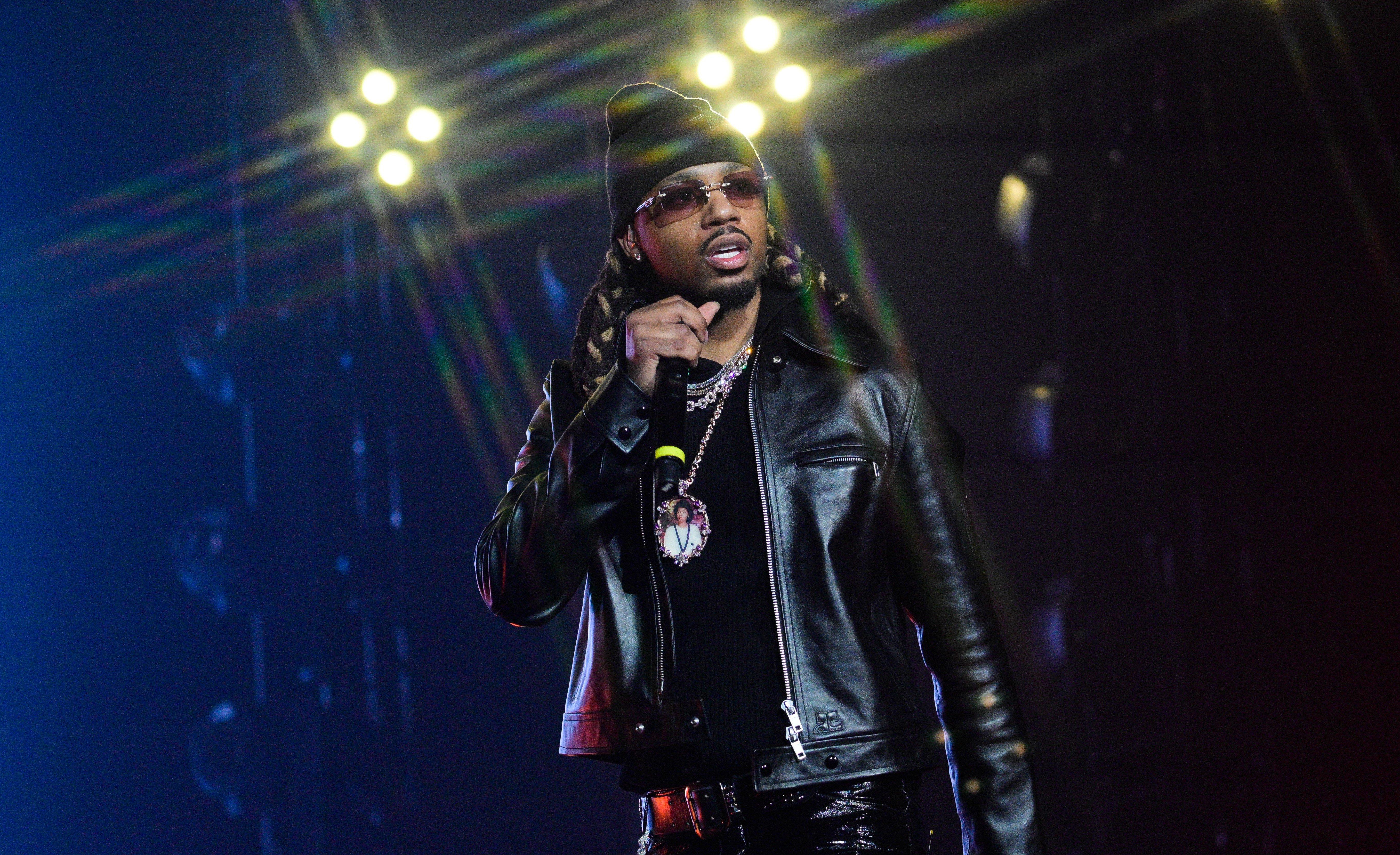
Photo: Prince Williams/Wireimage
list
Metro Boomin's Essential Songs: 10 Must-Know Tracks, From "Creepin" To "Like That"
The 2024 GRAMMY nominee for Producer Of The Year is one of hip-hop's most in-demand minds. Between his collab albums with Future and some highly debated beefs with rap's biggest stars, it's the perfect time to revisit the Metro-verse.
Metro Boomin has spent more than a decade redefining rap music. The gloomy, 808-induced trap beats that flood radio airwaves and blare from nightclub speakers are a symbol of his influence. But now, the Atlanta-based superproducer is on one of his biggest musical runs to date.
In April, Metro released the second of two joint albums with Future, hinted at a third release this year, sold out a concert at the Kundalini Grand Pyramids in Egypt, and clinched the No. 1 spot on Billboard’s Hot 100 with "Like That" featuring Kendrick Lamar. He also delivered a first-of-its-kind instrumental diss aimed at Drake called "BBL Drizzy," accusing the Toronto rapper of going under the knife.
The diss was in response to Drake’s "Push Ups" and subsequent disses toward Kendrick Lamar. "Metro shut your hoe ass up and make some drums" he rapped. The verbal blow inspired Metro to release the hilarious instrumental, which he encouraged fans to rap on for a chance to win a free beat.
Months before the feud, Metro celebrated two nominations for Best Rap Album and Producer of the Year, Non-Classical at the 66th GRAMMY Awards. While he didn’t take home a coveted golden gramophone, the momentum has elevated his career to new heights.
Before the St. Louis-bred producer kicks off the We Trust You tour with Future on July 30, revisit 10 of Metro Boomin's biggest releases.
"Karate Chop" (2013)
A 19-year-old Metro crafted his first charting single right before making a life-changing move to Atlanta. With piercing synths and bubbly arpeggios, the song was the lead single for Future’s highly anticipated sophomore album, Honest.
But Metro, a freshman at Morehouse College at the time, wasn’t sold on its success. "I never really like it," Metro told XXL. "Then every time people would come into the studio, he would always play the record and I was like, ‘Why are you so stuck on this s—? We have way harder records.’"
But after cranking out a new mix on the original track, "Karate Chop" went on to become his first placement on a major label album. The remix with Lil Wayne further elevated the record and, by virtue, Metro’s profile as a musical craftsman.
"Jumpman" (2015)
Metro mastered the late-summer anthem in 2015 with "Jumpman." The song was the most notable hit from Drake and Future’s collaborative mixtape, What a Time to Be Alive, and went on to shut down bustling nightclubs and obscure strip joints. And while the record didn’t perform as well as other songs on this list, it secured Future his first Top 20 hit.
The song — which features Metro’s signature bass and a screeching raven sound effect — also saw a streaming boost after an Apple Music commercial featuring Taylor Swift rapping to the song. According to Adweek, the campaign helped generate a 431 percent increase in global sales
What makes "Jumpman" even more special is that a collab between Future, Metro, and Drake may never happen again. Reportedly, the duo is at odds with Drake because the OVO artist decided to link with 21 Savage on Her Loss instead of doing a follow-up project with Future.
"Father Stretch My Hands Pt. 1" (2016)
"Father Stretch My Hands Pt. 1" is the song that set Kanye West’s album, Life of Pablo, ablaze. Opening with a clip of gospel musician and singer T.L. Barrett’s Father I Stretch My Hands,” Metro’s signature producer tag kicks the record into full gear. The pulsating synthesizers and bouncy percussion match West’s raunchy and sexually explicit lyrics.
Metro’s production received significant praise, with several publications pointing to his contributions on end-of-year listings. And in the eight years since its release, "Father Stretch My Hands Pt. 1" has been certified six times platinum by the Recording Industry Association of America, making it one of Ye’s most-sold records of all time.
"Congratulations" (2016)
After the success of "White Iverson," a young Post Malone was on the hunt for the hottest producers in the rap game. He managed to land Metro, who worked with fellow producers Frank Dukes and the prolific Louis Bell on the triumphant trap record "Congratulations."
On a 2022 episode of the podcast "Full Send," Metro revealed that the celebratory song was made after watching the world’s greatest athletes eclipse historic feats of their own. "I remember the Olympics was on TV, and just how the music was sounding, it sounded like some champion s—," he said.
"Congratulations" marked Post Malone’s second Top 20 hit following his debut, "White Iverson." The song was certified diamond after totaling more than 11 million combined sales. Today, it remains one of Metro’s biggest achievements.
"Bad and Boujee" (2017)
Fueled by virality and a shoutout from Donald Glover at the 2017 Golden Globes, the Migos and Lil Uzi Vert’s "Bad and Boujee" landed Metro Boomin his first No. 1 Billboard hit as a producer.
The song has every element Metro fans have grown to love: moody keys, hard-hitting bass, and plenty of room for the artists’ adlibs to pierce through the track.
Two months before its eventual ascension, the song had a steep hill to climb atop the Billboard charts. But Metro’s production and the chemistry between Quavo, Offset, and Uzi helped the record shoot up to its rightful place. It continues to garner praise In the years since its 2016 release, too. It was ranked No. 451 on Rolling Stone’s "500 Greatest Songs of All Time" list
"Mask Off" (2017)
When "Mask Off" dropped in 2017, it scorched the Billboard charts. Hip-hop was flirting with flutes (as heard on songs like Drake’s "Portland" and Kodak Black’s "Tunnel Vision" — another Metro-produced beat) — but "Mask Off" stands out as the biggest song of the short-lived era.
Metro infused jazz-like undertones to perfectly meld the flute lick into the dark and mystic beat. The record led to the remix with Kendrick Lamar, with his verse breathing new life into the already-seismic hit. It’s now certified nine times platinum.
Years after the song’s release, Future said "Mask Off" initially put radio programmers in disarray. In his East Atlanta rapper’s Apple Music documentary The WIZRD, he revealed that the song dropped before Carlton WIlliams’ "Prison Song" sample was officially cleared. "Out of all the songs, ‘Mask Off’ wasn’t even legit," he said. "The s— was on the radio, they’re thinking it’s not a sample, but it got so big they were like, ‘It’s a sample.’"
"Heartless" (2019)
The Weeknd's "Heartless" is a pop and electro-clash classic that fires on all cylinders. The visuals are atmospheric, the lyrics are ultra-stimulating, and the production — partly handled by Metro — makes for a lasting club banger.
The leading single for The Weeknd’s fourth studio album, After Hours, topped the Billboard charts. It marked the Toronto-born crooner’s fourth No. 1 hit and unveiled the depths of Metro’s musical arsenal.
Metro produced four tracks on After Hours: "Faith," "Escape from L.A.," "Until I Bleed Out" and "Heartless." On the latter and in his other collaborations with The Weeknd, James Blake, and Solange, Metro’s creative sorcery was tested. He proved, once again, that he could generate a hit outside the confines of trap music.
"Creepin’" (2022)
After a solid outing on his first album Not All Heroes Wear Capes, Metro returned with another series of hard-hitting records. His second solo venture, Heroes & Villains, featured John Legend, Don Tolliver, Travis Scott, and other premiere artists. But the biggest song to come out of the star-studded lineup was "Creepin’" featuring 21 Savage and The Weeknd.
The only single to Metro’s second solo album struck sonic gold. The Weeknd’s flowy vocals overlay the silky and harmonic record, which transitions to a more trap-induced beat once 21 Savage’s verse kicks in. The remake of Mario Winans’ "I Don’t Wanna Know" was a notable departure from Metro’s past singles, which heavily lean on his trap roots. But it still managed to connect with his audience – and even beyond it. "Creepin" peaked at No. 3 on Billboard, which was Metro’s highest-charting solo record up until that point.
Spider-Man: Across The Spider-Verse (2023)
Following the success of "Creepin’" and his other smash singles, Metro extended his creative powers to the film world. He was given the green light to executive produce the soundtrack for Sony’s Spider-Man: Across the Spider-Verse.
Metro Boomin told Indie Wire that he crafted songs from rough animations and selected scenes "just to get in the world and the story of Miles [Morales] and what he’s going through," He even exchanged phone calls and texts with the film’s composer Daniel Pemberton to ensure the soundtrack and score were on the same accord.
From the classical serenade "Am I Dreaming" to the Latin swing of "Silk & Cologne" and the Timbaland-stomping "Nas Morales," the result was an equally transformative musical experience. Each record ranged in musicality and tone while beautifully complementing the vibrant animated superhero flick.
"Like That" (2024)
"Like That" is easily one of the best beats in Metro’s catalog, and may end up being one of the most memorable. Samples from Rodney O & Joe Cooley’s "Everlasting Bass" and Eazy-E’s 1989 classic "Eazy-Duz-It" shaped the bouncy trap beat, sinister synths, and spine-chilling baseline. But Kendrick Lamar’s verse turned it into a heat-seeking missile.
With the song’s thunderous bass and rapid hi-hats in the background, Kendrick dissed J. Cole and Drake for their recent claims of rap supremacy, particularly on 2023’s "First Person Shooter." The lyrical nuke sparked the Civil War-style rap feud, which led to a seven-song exchange between Kendrick and Drake.
The initial musical blow made the genre stand still. It also led to the massive success of the record, which notched Future and Metro another No. 1 hit song. It also helped the pair’s album, We Don’t Trust You, claim the top spot on the Billboard 200 albums chart.
